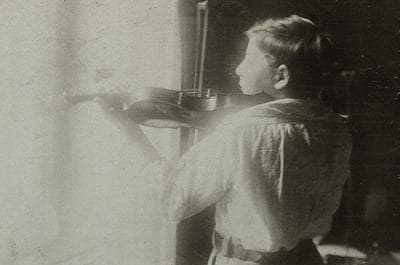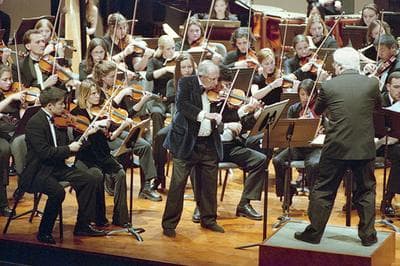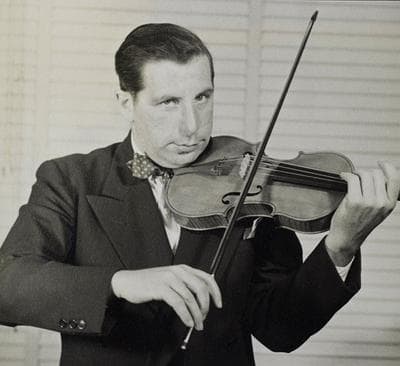Advertisement
Violinist Roman Totenberg Leaves Behind A Musical Legacy
Resume
Roman Totenberg, the world-famous violinist and Boston University professor of music, died early Tuesday morning at his home in Newton. He was 101.
I met Totenberg about six years ago, when NPR asked me to prepare a profile for the violinist's 95th birthday. He was soft-spoken and mild-mannered, but also had a sweet sense of humor. The musician joked about his centuries-old Guarneri violin.
"So you see there are older things than I am," Totenberg said with a laugh.
I admit I was taken with Totenberg. His daughter, NPR correspondent Nina Totenberg, said I'm not alone.
"My sister Jill wrote, on his 90th birthday, a rap song. Always women were falling in love with [my father] and saying how sweet he was, how wonderful, they wanted to spend time with him. And the refrain [of the rap was] was 'Get in line, get in line, you're number 5,999,' " Nina laughed. "So he was adorable!"
Nina said her father's death was as remarkable as his life. He had a career that spanned nine decades.
"From the time he made his debut as a soloist with the Warsaw Philharmonic when he was 11 years old, to his debut in this country when he was 24, he was such a success, such a huge success that he was called to the White House to perform for President Roosevelt," she said. "And he had played three weeks earlier for the King of Italy. And it had been a very formal affair, he had to borrow a top hat and cape from the Polish ambassador."

That scenario is a reflection of Totenberg's humble beginnings. He was a New Year's baby, born on Jan. 1, 1911, in Warsaw. A child prodigy, Totenberg picked up a violin at age 7, and was performing, as Nina said, by age 11. Totenberg's family moved to Moscow, and he recalled how he supported them by performing.
"Invariably, people gave us white bread and butter and other things to eat, which we'd take home, and that was the first impression of the value of the art and what it can bring to you, to survive, so to say," Roman said.
But Nina said her father rarely brought up the hardships of his past. For Roman, music was what made life worth living, and he made a lot of it over the course of his fruitful career. At age 20, Roman fled to Paris where he made friends with other artists, such as Pablo Picasso and Igor Stravinsky. Roman ultimately recorded with Igor and his son, Soulima Stravinsky.
He played with all of the major orchestras in Europe. As fascism spread he came to the U.S. and would go on to perform with a long list of orchestras, including the Boston Symphony Orchestra and the New York Philharmonic. He taught at music schools throughout the country, and became the director of the Longy School of Music in 1978. He was also a professor of music at Boston University starting in 1961, where he continued to teach right up until his death.
"Once we realized that he was in renal failure, and as word got out that he was dying, former students flocked to the house," Nina said. "And he was only interested in one thing — hearing them play."
"My parents brought me into the this world, and he taught me how to live in it," said violinist Mira Wang, who started studying with Roman when she was a teenager. Wang said she first met him at an international violin competition where he was a judge. The Chinese government had sent her to the contest.
"We all knew his name when we were in China, and I did use the chance to ask him if he could help me to come and study with him in the states, and so he helped me to get a scholarship at BU and I came to BU in 1986."

Wang studied with Totenberg for six years before moving on to become a professional musician herself. She said she, like many of his students, just had to see him while he was still alive.
"I came on Sunday to see him because I knew that he was coming to the end of his life, and I think I spent most of that time there just to play music for him, and I truly felt he knew and understood who was there, and I think that's the connection I felt between him and myself, and that's how we met, through music, and that's how we parted," Wang said.
Roman died early Tuesday morning of renal failure. The 101-year-old father of three daughters was surrounded by family after only being sick in bed for a week. Like a lot of people who knew him, former Boston Globe music critic Richard Dyer is saddened by the news because he said Totenberg represents a disappearing part of history.
"Roman and Edda Hendle, who was one of his students back in Poland, are the last representatives of a whole musical culture that flourished before the second World War, so something irreplaceable has been lost," Dyer said. "Every artist is irreplaceable, but him more than most because he lived so long and was able to share so much about a time before our own."
In the end, Nina said her father held on to life. In his death bed, he just didn't want to let it go.
"My sister said you could see why he lived so long and he fought death because he just growled at it," Nina said. "And eventually he calmed down, but he was still obviously listening to music in his head, because his hand was conducting still."
There will be a memorial service for Roman Totenberg in September.
More:
